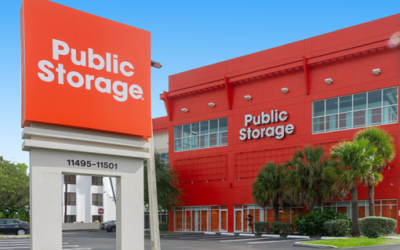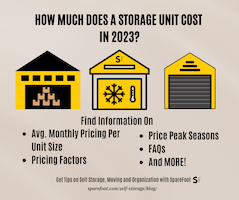About half of American households have a basement. If you are lucky enough to have one, chances are you use it for extra storage of your belongings. In fact, more than 40% of basement owners said they use their basement for storing excess household goods, according to a survey by Regional Foundation Repair.
If this is your case too, I’d like to show you how to organize your basement storage to maximize space and keep everything neat and safe. We’ll start with the trusty shelves but know that there are at least six other approaches to organizing basement storage (also in this guide), and the best solution is to mix and match them according to your space and needs. Here we go.
1. Basement Shelving Units
Shelving units are a great start to your basement organization project as they let you stack things up high, so you have more room to move around.
Oh, and when I say “shelves,” I mean open shelving. This lets air circulate (goodbye, musty smells!) and lets you see and grab what you need without rummaging through piles.
Choose the right basement shelving
First of all, make sure you get adjustable shelves. This way, you can customize the storage space to fit items of various sizes, from tiny knick-knacks to bulky bins.
The material matters too. Opt for rust-proof, adjustable metal units. These should be sturdy enough and just right for the basement’s unique conditions. Plastic and wire units are also viable. Just keep away from wooden basement shelving – dampness is its nemesis.
For extra flexibility to rearrange your space as needed, consider mobile solutions like heavy-duty metal racks on wheels. They will make it easier to reach maintenance areas or simply change up the layout.
Pro Tip: Keep an eye out for sales on sturdy storage shelves. Affordable doesn’t have to mean low quality.
How to organize a basement with storage shelves
The underlying rule of all basement organization ideas is to keep things off the floor, to protect against water damage. In addition to this step, consider storing irreplaceable items on the highest shelf as a precaution against potential water intrusion.
Memorabilia aside, the placement strategy should also focus on heavier items anchoring the bottom shelves, and lighter ones above. All of this is easy to do with adjustable shelves, without losing too much storage height.
Do you have many items in a single category? Dedicate an entire shelving unit to them. Label this specialized zone so that you can find things faster and know where to put everything back.
2. Plastic Bins and Containers
With basement shelving in place, the next step is to fill it up with clear plastic bins and containers. Why clear and not color-coded? Simply because the clear ones let you spot what you need from the get-go. Why plastic bins and not cardboard boxes? Cardboard might seem like a good idea until it gets damp, smells weird or becomes a new home for mice. Plastic containers, on the other hand, will keep your stuff safe from dust, pests and dampness. Plus, when you stack them or pop them on shelves, your basement stays looking neat.
Looking for basement storage ideas and tips for organizing it with plastic bins? Look no further:
- Choose stackable, airtight containers for extra protection. Tuck in some desiccant packets to fight off moisture.
- Opt for bins with locking lids. The ones where the lid wraps around the rim will inevitably warp over time and no longer be airtight.
- Group your items and slap a large label on each bin. You’ll know exactly what’s inside and where it should go.
3. Pegboards
Ah, pegboards. These handy panels are all about keeping things off the floor and at your fingertips. They are a great addition to any basement or garage as everything you hang on them will be easy to see and grab.
Use basement pegboards for:
- things you use often;
- jackets and aprons;
- small items like work gloves; and
- long items that are more difficult to store, like brooms and mops.
Pro Tip: Put a small pegboard by the basement door and say goodbye to misplacing keys and other go-to items.
4. Ceiling Storage Racks
Now that your basement is shaping up with shelving and pegboards, let’s look up — to the ceiling, that is. Yep, that often-forgotten space above can be a storage goldmine. Organizing basement storage with ceiling racks is a fantastic way to tuck away things you don’t use every day but still need to keep around.
Note that they are best for lighter, awkwardly shaped items. Think skis, surfboards or a folded-up Christmas tree. Got luggage, holiday decor or camping gear? Overhead racks can handle that too. For things like bikes, folding chairs or seasonal items, heavy-duty hooks are your friend.
DIY basement storage idea
Now, if you’re handy, you can create your very own storage solutions. Use old wire shelving or buy some cheap at the store to build a place for plastic totes and other items.
Secure everything with sturdy nails or staples, and voilà — you’ve got yourself an overhead organizer. The beauty of wire shelving is you can see exactly what’s stored up there.
Safety Tips: Make sure you can easily reach what you store. Use a sturdy ladder, keep the heavy stuff on the ground to avoid accidents and don’t overcrowd the space.
5. Cabinets and Lockers
Now that you’ve looked up to the ceiling for storage, it’s time to bring it back down to eye level with cabinets and lockers, the perfect choice for when you want to keep things tidy and out of sight but still within reach.
- Use cabinets or lockers for smaller items, cleaning supplies or those hobby materials that seem to multiply overnight.
- No dedicated storage room? No problem. Vintage lockers can add a cool, industrial vibe to your space while hiding seasonal clothes, sports gear and gardening tools.
- If your basement doubles as a laundry area, cabinets will keep detergent, fabric softener and all those mismatched socks neatly hidden away.
So, finished with a kitchen remodel? Don’t toss those old cabinets! Offer them a second life in your basement — it’s budget-friendly, practical and eco-conscious.
Pro Tip: Though hidden, it’s still a good idea to stay organized. Inside those cabinets, consider using bins or baskets to keep smaller items in their spot.
6. Under-Stair Storage
With your ceiling and eye-level storage sorted, it’s time to take a look under the stairs. Following on from using cabinets and lockers, why not extend this savvy storage solution to this basement nook? It will look really neat and cohesive.
However, if cabinets and lockers don’t fit properly in the available space, go ahead and stack your stuff on adjustable open shelves. And, if you prefer a cleaner look, conceal them with a simple curtain. Once again, even if hidden behind a curtain or door, don’t overlook keeping these basement storage shelves organized with labels, bins and baskets.
Pro Tip: Is your basement close to the kitchen? Create your own pantry under the basement stairs. You can go for built-in options or just get creative with a mix of boxes, baskets and jars.
7. Wall-Mounted Storage
Alright, let’s take a climb up the walls — not literally, but with our storage strategy. After decking out the floor and squeezing every inch out of under-stair spaces, the walls beckon with untapped potential. I’m talking about wall-mounted systems where you can hang up just about anything.
After all, what you know as a “garage wall track system” isn’t just for the garage. It works wonders in the basement too. Since hooks and accessories are adjustable, you can customize them to fit your needs, whether it’s for bikes, gardening tools, camping gear, you name it.
Take tires, for instance. They can be a real space hog. An adjustable tire rack on the wall keeps them out of the way until it’s time to switch them out. Just look for adjustable racks so that you can fit various tire sizes for any vehicle. Or, perhaps you’ve got a surfboard or kayak gathering dust in a corner. A special wall-mounted rack keeps them secure and out of the way, while also displaying them nicely.
Speaking of displaying, why not get a bit creative with these wall-mounted systems? They’re great basement storage ideas, sure, but they can be a part of the decor too. Paint the racks or hooks in bright colors or arrange them in patterns. Your basement storage turns into a wall feature, merging functionality with style.
Now You Know How To Organize a Basement
If you are using your basement for storage, properly organizing the space can also go a long way toward protecting your items from moisture, pests and dust. The above basement storage ideas and tips will help you preserve your precious goods for months and years to come. Plus, they’ll also help you keep your sanity when you need to find something. That’s as good as it gets.


